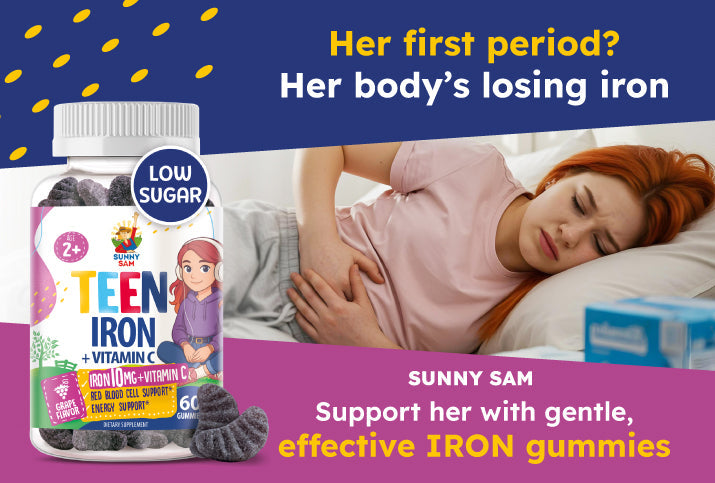If you’re constantly feeling tired during your period, chances are it’s not just hormones. It’s normal, even expected, to feel a little off during the cycle. There’s the bloating, the cramps, the mood swings - at some point, you get used to brushing it all off. But here’s what a lot of people don’t know: your period can drain your iron levels, and that might be the exact thing that leaves you feeling wiped out long after the worst of the bleeding stops.
Iron loss during menstruation is normal, but it doesn’t mean you should let it go unaddressed. No one really brings up the quiet fatigue that creeps in when your iron runs low, mostly because we think that it’s how we should be feeling. The truth is, your body deserves more than a shrug and another cup of coffee.
This blog breaks down what’s really happening with your iron levels each month and what you can do to support your body before, during, and after your cycle. And if you ever feel like you can’t always maintain an iron-rich diet, Sunny Sam’s gummies are always in your corner to make iron intake a lot simpler.
Iron Depletion During Periods
Let’s start with the basics. Every time you have your period, you lose blood. And with that blood, you lose iron. Your body needs iron to make hemoglobin, which carries oxygen in your red blood cells. When iron runs low, oxygen delivery slows down. That’s when the exhaustion hits.
On average, women lose around 30 to 40 milliliters of blood per cycle. That might not sound like much, but it adds up. Each cycle can cost you about 15 to 25 milligrams of iron. If you’re not putting that iron back in through your diet or supplements, your body starts to feel the strain.
Some women are at greater risk of falling behind. If your periods are heavy and last more than 7 days, you’re losing more iron than average. If you follow a low-iron diet, especially one that’s plant-based without enough iron-rich foods, your stores might not keep up. Female athletes also fall into the high-risk group, because intense training can impact how your body uses and absorbs nutrients, including iron.
Signs Your Body Might Be Low on Iron
Iron deficiency doesn’t always scream for attention. It creeps in quietly, leaving you to guess why you’re dragging yourself through the day. But your body does drop hints.
Physical Symptoms
Feeling tired is one thing. Feeling like you’ve hit a wall just walking up the stairs is another. When iron levels drop, your body struggles to make enough hemoglobin, which means less oxygen gets delivered to your muscles and organs. That’s when fatigue turns into weakness, and normal activities suddenly feel like a full-body workout. Dizziness can creep in when you stand up too fast. You might notice your hands and feet stay cold even in warm rooms. These aren’t random quirks, but rather your body waving a flag. When you’re running low on iron, everything slows down, including circulation and energy production.
Cognitive or Emotional Signs
Iron isn’t just about physical strength, it’s tied to how clearly you think and how steadily you feel. Low levels can lead to brain fog that makes simple tasks feel strangely difficult. You sit down to focus, but your thoughts feel scattered. You walk into a room and forget why. Mood swings can also become more noticeable. Some people feel more irritable than usual or quick to snap at small things. If your emotions feel out of sync or your mental focus is just off, it might not be stress or lack of sleep, it could be your iron quietly dragging you down.
When It’s More Than Just PMS
It’s easy to blame everything on PMS, especially when symptoms show up around your period like clockwork. But if your fatigue is intense, your mood feels flat, or your brain feels foggy long after your period ends, there might be something deeper going on. Iron deficiency and PMS can look similar on the surface: fatigue, mood swings, brain fog - they both share all of these symptoms. But the difference is in how long those symptoms linger and how heavy they hit. If every cycle leaves you feeling completely depleted and it takes you days or even weeks to feel like yourself again, iron might be the missing piece your body’s been trying to tell you about.
How to Replenish Iron Before and After Your Period
Most of the time, you won’t notice your iron stores falling. But if you start giving your body the support it needs ahead of your period, you can avoid the crash. A few simple habits can go a long way.
Diet Tips
Start with food. Heme iron, which is found in animal products like red meat, poultry, and fish, is easier for your body to absorb. Non-heme iron, found in plant-based foods like lentils, spinach, and tofu, is still great but needs a little help.
Pairing iron-rich meals with foods high in vitamin C, like oranges, strawberries, or bell peppers, can improve absorption. A spinach salad is good. A spinach salad with lemon juice or sliced strawberries is better. The same is true for supplements: an iron supplement is great, but Sunny Sam’s iron gummies with vitamin C? A lot better.
At the same time, keep an eye on things that block absorption. Drinking tea or coffee right before or after meals can make it harder for your body to absorb iron from food.
Supplements
If you’re not getting enough iron through meals (or if your doctor has flagged low levels) supplements can help fill the gap. Sunny Sam’s Iron Gummies with Vitamin C are a solid option. They’re designed to be gentle on the stomach and easy to take daily. No metallic taste, no chalky tablets, and no guesswork. The added vitamin C also gives your body that absorption boost it needs.
These gummies are sugar free, too, so you’re not loading up on anything unnecessary. They’re especially helpful for women with heavier periods, plant-based diets, or anyone who just struggles to keep their iron levels where they need to be.
Lifestyle Support
Iron isn’t just about what you eat. It’s about how you live. Poor sleep, chronic stress, and dehydration can all impact how well your body absorbs and uses nutrients. Getting enough rest, staying hydrated, and managing stress levels all help your body maintain balance.
Also, watch out for calcium-heavy meals right around your iron intake. Calcium competes with iron for absorption, so try not to take your iron supplement with a big glass of milk or a calcium-packed snack.
The Bottom Line
Your period does more than affect your mood. It directly impacts your body’s iron levels, and ignoring that can lead to long-term fatigue and poor health. The good news? You have control. You can plan ahead, fuel your body with the right foods, and use supplements when you need a little extra help. Here’s what to remember:
-
Your period can deplete iron
-
Fatigue isn’t always normal
-
Diet and supplements can help keep you balanced
Don’t wait until your body crashes to pay attention. Support your cycle before it takes a toll. If you’re ready to start, Sunny Sam’s Iron Gummies are an easy first step that fits into your routine and actually makes a difference. But never forget to check in with your healthcare provider before introducing any new supplements into your diet.


